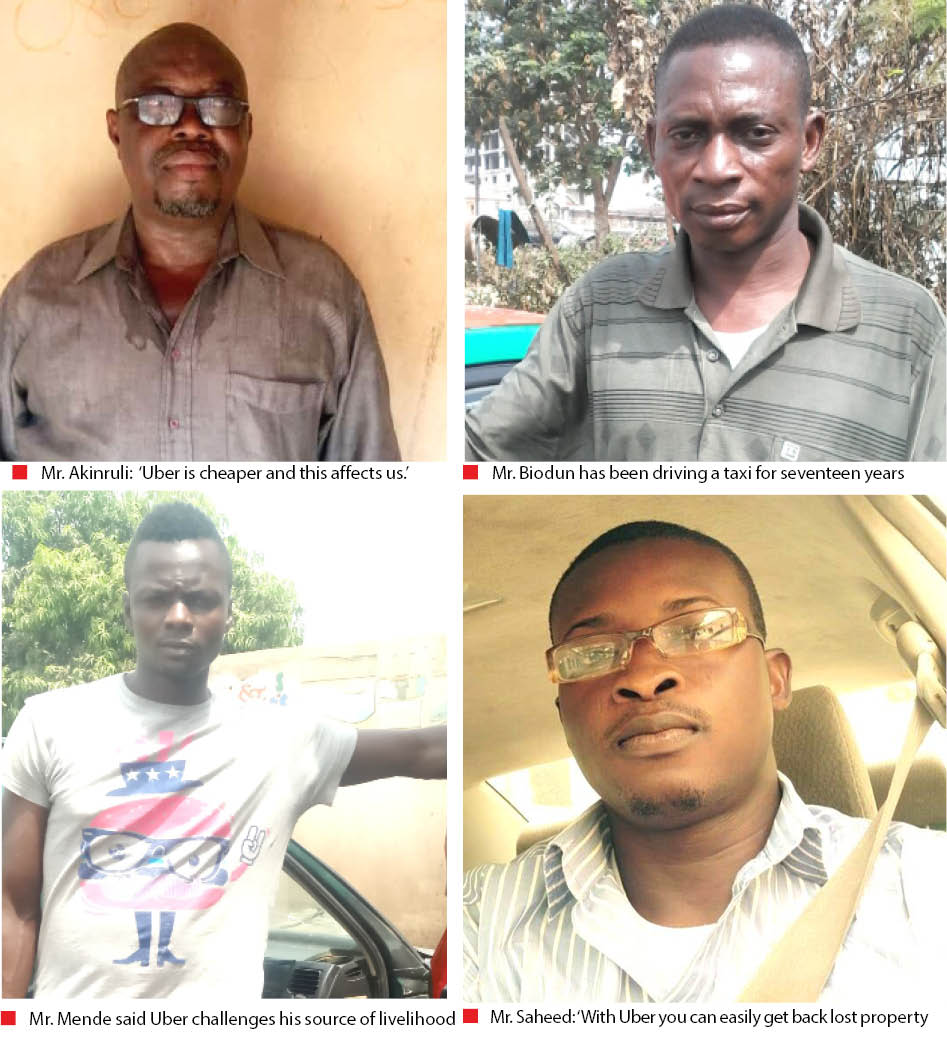Taxi drivers: How Uber, Taxify are affecting our biz
The competition started a few years ago when app-based transport service companies, Uber and Taxify were introduced into the country. As their drivers move in to take charge of intracity transportation in major cities in Nigeria, taxi drivers groan, Daily Trust reports. Aside commercial motorcyclists and trycyclists, taxi drivers have had a near monopoly […]

The competition started a few years ago when app-based transport service companies, Uber and Taxify were introduced into the country. As their drivers move in to take charge of intracity transportation in major cities in Nigeria, taxi drivers groan, Daily Trust reports.
Aside commercial motorcyclists and trycyclists, taxi drivers have had a near monopoly of intra-city transport in Nigeria for a very long time. This ended in 2014 with the introduction of Uber in the country and later Taxify in 2016.
Both ride-hailing services, Uber and Taxify have fundamentally changed inner-city transit in Nigerian cities where they are operational. First launched in Lagos, Uber came to Abuja in 2016. Taxify, on the other hand, was introduced into Lagos in 2016, Abuja in 2017, and Ibadan and Owerri in 2018.
Uber and Taxify are app-based platforms that allow passengers, by using their phones, to request for a driver to pick them up and take them to their destination. Using a special algorithm, the app matches a customer to the nearest pre-verified taxi and provides a fare estimate. It also automatically charges the costumer’s registered card while the driver gets paid directly into his bank account, so no cash needs to be exchanged. This has quickly marked them as threats to the conventional taxi in Nigerian cities, Daily Trust Saturday has gathered.
Some taxi drivers like Mr. Yinka Akinruli in Lagos said the ride-hailing service has affected the car hire business negatively resulting to low patronage because people prefer to call them to their doorsteps than go to a car hire park. This, he pointed out, has affected his daily income, especially because the Uber fare is cheaper. “For instance, from the Lagos airport, which I ply regularly, to Acme Road in Ogba, I normally charge between N1,500 to N2,000 depending on the traffic. But Uber will charge between N8,000 to N1,000 for that same distance,” he said.
Akinruli however admitted that the app-based transportation service comfort thrills passengers, but pointed out that some taxis too are clean and comfortable. In order to outshine or compete, cab drivers and car hire must maintain good relationship with customers, as well as keep themselves and their cars clean.
In Utako Motor Park, commonly called Jabi Park, John Mende, 32, who drives a Toyota Camry lamented poor patronage, which has affected his daily income. “I have been a taxi driver for the past eighteen years and have been doing well. Now Uber challenges our source of livelihood,” he said.
John used to make up to N15,000, but now makes about N7,000 in a day. “It’s not about expensive cars, but the good service one can offer,” he pointed out. “People complain that we are dirty and that taxis are not safe. Bui I am not giving up.”
A Lagos resident, Mr. Ibrahim Musa told Daily Trust Saturday that before app-based transport service came to Nigeria, some taxi drivers displayed a lackadaisical attitude towards the business. “They leave their cars unkempt and poorly maintained. Above all, some of them lack manners and talk to passengers without decorum. Uber has come with a difference, and passengers are being treated like kings while they enjoy the comfort they deserve as they take a ride to their destination,” he said. “Before now, you would enter a taxi and have your clothes messed up with dirt. Uber is clean and air-conditioned. The drivers are also clean and well-dressed, and to crown it all, the fare is cheaper.”
Interestingly, a taxi driver, Mr. Yakub Ibrahim, 45, veered in a different direction from his colleagues. As far as he is concerned, the other form of transport does not affect him in any way. He has been a cabby for seventeen years and its business as usual for him. “They run their business and I run mine,” he pointed out. “I make at least N8,000 in a day. I only hear fellow colleagues complain about how Uber and Taxify affect their work.”
A graduate of Business Administration, Mr. Abolarinwa Saheed was once a taxi. Now he is an Uber driver in Abuja. “The world is changing every day and relies on technology,” he said and gave reasons why Uber is popular. If a passenger forgets his property, the mobile number of the driver can be traced. Also, the passenger can visit Uber office to verify the booking. In addition, the amount charged, per trip, is determined by distance travelled, and every driver pays twenty-five per cent into the Uber account. “To become an Uber driver, your car must be a model not older than 2003 and also be neat.”
Chairman of God is Good Motors in Abuja who did not want his name mentioned said there is room for healthy rivalry in the transport business, just like any other venture.
However, an agent of God is Good Motors and taxi driver boasted that taxi drivers are at almost every location, unlike their competitors, and when network fails passengers, taxis come to the rescue.
The competition continues as more and more Nigerians get hooked to their smartphones and as Uber and Taxify most likely expand into other commercially viable cities, such as Kano, Kaduna, Port Harcourt and several more.
